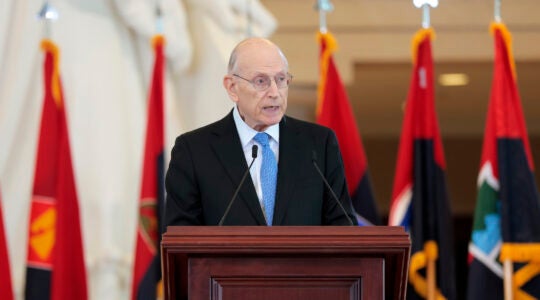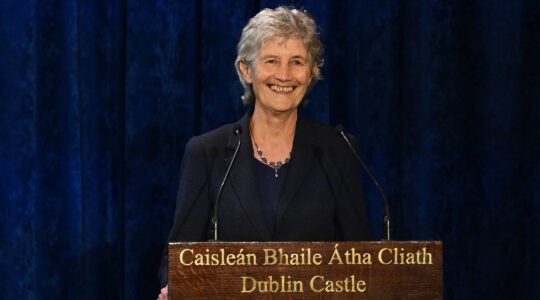(JTA) — A British parliamentary committee of inquiry upheld claims that the Labour Party’s leadership is failing to confront seriously anti-Semitism in its ranks.
Raised persistently by leaders of British Jewry following the election last year of the far-left politician Jeremy Corbyn to lead Labour, the accusation was reaffirmed Sunday in the publication of a scathing report. Titled “Anti-Semitism in the UK,” it was compiled by the Home Affairs Select Committee of the House of Commons, the lower house of the United Kingdom.
Corbyn’s “lack of consistent leadership on this issue, and his reluctance to separate anti-Semitism from other forms of racism, has created what some have referred to as a ‘safe space’ for those with vile attitudes towards Jewish people,” read the withering report, which was agreed upon unanimously by the 11 lawmakers who wrote it. Five of them were from Labour.
The document is the first major independent probe into anti-Semitism in Labour under Corbyn – a problem that the Board of Deputies of British Jews and other community organs have accused Corbyn of downplaying and even whitewashing in internal party probes.
Noting Corbyn’s ties to individuals accused of anti-Semitism and his 2009 expression of support for Hamas and Hezbollah – a gesture he in July said he regretted – the report further states that, “despite his proud record on fighting racism, the Committee is not persuaded that Mr. Corbyn fully appreciates the distinct nature of contemporary anti-Semitism, and the fact that it is perfectly possible for an ‘anti-racist campaigner’ to express anti-Semitic views.”
This and other failures were “exacerbated by the party’s demonstrable incompetence at dealing with members accused of anti-Semitism,” read the 70-page document.
The report follows intense scrutiny of Labour in the British media, which have reported on dozens of cases involving hate speech against Jews or Israel by party members, including senior lawmakers loyal to Corbyn. While many Corbyn supporters dismissed the accusations as smears, he has vowed to suspend anyone making racist or anti-Semitic statements. However, Corbyn has declined to define anti-Semitism.
The Home Affairs report called on Labour to adopt a definition of anti-Semitism, take stricter action against those caught making anti-Semitic statements and train members on the difference between criticizing Israel and disseminating anti-Semitism, among other steps.
The report urged “law enforcement and political party officials” to treat the word “Zio” or “Zionist” in an accusatory context as “inflammatory and potentially anti-Semitic,” wrote the authors, who added some anti-Semites use that term instead of saying “Jewish” or “Jew.”
Two internal probes designed to assess the prevalence of expressions of anti-Semitic in Labour — one of the entire party and another of its Oxford University club — said the party had a minority of anti-Semites but no institutional anti-Semitism.
Yet the parliamentary report said both probes were flawed. “The failure of the Labour Party consistently and effectively to deal with anti-Semitic incidents in recent years risks lending force to allegations that elements of the Labour movement are institutionally anti-Semitic,” according to the report.
The promotion of the human rights activist Shami Chakarbarti to Labour lawmaker shortly after she penned a report clearing Labour of institutional anti-Semitism has “thrown into question her claims (and those of Mr. Corbyn) that her inquiry was truly independent,” read the Home Affairs Committee report. It also stressed “that all parties must examine” whether they should also follow the recommendations it listed.
The judiciary and executive branch’s handling of anti-Semitic crime was “excellent,” according to the report, which asserted that anti-Semitic sentiment appears to be more rare in British society compared to other European countries.
“While acknowledging the Labour Party’s efforts to address anti-Semitism, the Committee’s report calls for sweeping reforms to the Party’s disciplinary processes,” the report read. The Committee also criticized the president of the National Union of Students, Malia Bouattia, for “failing to take sufficiently seriously the issue of anti-Semitism on university campuses.”
Leaders of the British Jewish community praised the report, including the president of the Board of Deputies of British Jews, Jonathan Arkush, who said it was “a critical source document for future work in the area.” James Sorene, CEO of the BICOM pro-Israel group, said in a statement: “This report brings much needed clarity where previously there has been denial, obfuscation and abdication of responsibility.”
Mick Davis, chairman of the Jewish Leadership Council said: “The Home Affairs Select Committee have delivered a serious report which has made serious recommendations.”
Jonathan Sacerdoti, a founding trustee of the Campaign Against Antisemitism charity, said that, “The importance of this report should not be underestimated” as it “finally goes much further towards properly acknowledging the many ways in which Jewish people have long known anti-Semitism was being allowed to take root in Britain.”
JTA has documented Jewish history in real-time for over a century. Keep our journalism strong by joining us in supporting independent, award-winning reporting.






